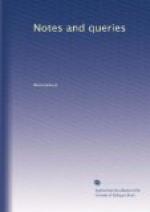I have been thus particular in transcribing this passage from Cole, because this copy, mentioned as being in the possession of Mr. Knight, jun. (quere, where is it now?), varies from mine, obtained from Mr. Heber’s Collection, and was no doubt the one prepared and corrected for the press by Basse. The following poems, mentioned by Cole, are not in my copy:—
“To the Right Hon. the Lady Aungier (then wife of Sir Thos. Wenman) upon her coming out of Ireland, {297} and return thither. Acrostics of the truly noble, vertuous, and learned Lady, the Lady Agnes Wenman; of the Lady Penelope Dynham; of Mrs. Jane Wenman. Verses on the Chapel of Wadham College consecration, St. Peter’s Day, 1613; and on Caversham or Causham House.”
My copy, however, contains the following poems, not mentioned in the other:—
“Of a Great Floud; of
the Raine-bowe; of Pen and Pensill, upon a
fayre and vertuous Ladye’s
Picture; and the Spirituall Race.”
The MS. contains 52 leaves, beautifully written without any corrections, and is in the original binding. It was procured by Mr. Heber from Hanwell, the Bookseller in Oxford, who had probably purchased it on the taking down of Ricot, the old seat of the Norreys family, and the dispersion of its contents. It has the autograph of Francis Lord Norreys on the fly-leaf, and was no doubt a presentation copy to him from Basse. The poetry of this work does not rise above mediocrity, and is not equal in thought or vigour to the Epitaph on Shakspeare. The chief portion of the volume is occupied with the singular tale of “The Youth in the Boat,” which is divided into two parts; the first, containing (with the introduction) 59 verses of four lines each, and the second 163, exclusive of the “Morall,” which occupies 11 more.
We know that it was Basse’s intention to have published these poems, from some lines addressed by Dr. Ralph Bathurst “To Mr. W. Basse upon the intended publication of his poems, January 13. 1651,” which are given in Warton’s Life and Literary Remains of Dean Bathurst, 8vo. 1761, p. 288. In these lines the Dean compares Basse, who was still living, “to an aged oak,” and says:—
“Though thy grey Muse grew up with
elder times,
And our deceased Grandsires lisp’d
thy rhymes,
Yet we can sing thee too.”
From these lines, therefore, written nearly 50 years after the publication of his former works in 1602, when we may reasonably suppose he could not have been under 20, it is certain that Basse was then well stricken in years; and the probability is, that he died very shortly afterwards, and that this was the reason of the non-publication of his poems. It is possible that a search into the registers at Thame or that neighbourhood, or in the court at Oxford, might settle this point, and also furnish some further information concerning his family and connections. Cole mentions that a person of both his names was admitted a sizar in Emanuel College, Cambridge, in 1629, of Suffolk, and took his degree of B.A. in 1632 and M.A. in 1636. But this was too modern a date for our poet, and might possibly be his son.




